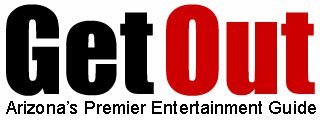 Hale’s ‘My Fair Lady’ is swell, but c’mon — let’s call a spade a spade Hale’s ‘My Fair Lady’ is swell, but c’mon — let’s call a spade a spade
By CHRIS PAGE
Get Out
Here we are, living free in swingin’ 2004, and recent State of the Union address notwithstanding, I think we’re all open-minded and queer-eyed enough to allow for one simple indulgence: Please, please, let’s let Henry Higgins out of the closet.
Protagonist of the grand musical “My Fair Lady” — represented, and still repressed, here in a fine production at Gilbert’s Hale Centre Theatre — Higgins (played here by Jack Pauly) is a portrait in homosexual hush-hushery. He's had to conceal his sexual predilection from early 20th-century London’s aristocracy under the guise of a “confirmed bachelor,” a term that’s as loaded as “friend of Dorothy.” In the process, he’s had to hide an obviously amorous relationship with Col. “Don’t Ask, Don’t Tell” Pickering (Dorman Smith).
Closet-frustration has caused Higgins to adopt a kind of misogyny that reduces the fairer sex to mere objets d’sport. So it’s no surprise that he, a renowned phonetician (sadly, a career not represented in the Village People lineup), would treat the task of turning impoverished flower peddler Eliza (Athena Reiss) into a proper lady about as impersonal as putting together a futon from Ikea.
Were we to, ahem, gay-up “My Fair Lady,” we’d see it for what it really is: not a love story, but a semisweet tale of an uptight Will who finds his Grace. That it’s been packaged as a romantic comedy serves only to make audiences curious (“Why is their chemistry so tense?”) and, I’m sure, to allow playwrights Alan Jay Lerner and George Bernard Shaw to giggle privately.
An openly gay Higgins — excuse me, in cockney that’s “an ’omosexual ’iggins,” which is funnier — would be refreshing. He would dance about the stage, singing with newfound gusto. And he’d be able to openly fawn over Hale costumers Sandy Dietlein and Cindy Smith’s gorgeous, lavish black-and-white Ascot gowns. (Maybe even ask to try on one of those towering, wedding-cake fancy hats, too.)
Heck, audiences would be so much more at ease with everything out in the open, they’d be free to sit back and relish “My Fair Lady’s” incredible score, crammed with favorites like “Wouldn’t It Be Loverly,” “The Rain in Spain” and “Get Me to the Church on Time.” At the Hale, the songs are given respectable, sometimes magical, treatment by the cast. (The amplified audio, though, isn’t mixed in favor of the vocalists. It’s heavy on the prerecorded music.)
The Hale presents this “Lady,” as it does all its plays, in the round, a relatively unusual format for this classic but one that works nicely. It allows director Allan Dietlein to deconstruct the play and mine it for its more intimate treasures, like the scenes featuring Eliza’s drunkard bum of a father, Alfred (played by Curt Wooley, resembling a down-on-his-luck Monopoly mascot), and the crooning street urchins who populate London’s underbelly. With such a cold character in homo-
frustrated Higgins, after all, “My Fair Lady” can use all the intimacy it can get.
This production’s acting is generally good stuff, and the English accents (guided by coach Julie Van Lith) are solid enough to pass. Pauly’s Higgins sounds a bit too much like Hank Azaria in “Mystery Men” for my tastes, but then again, my queer eye wanted him to be more like Hank Azaria in “The Birdcage.”
Poor Henry Higgins. A master of words, and yet there’s one thing he cannot say: I’m here, I’m queer, get used to it.
|




